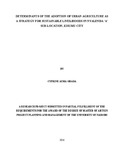| dc.description.abstract | Urban agriculture is the practice of crop cultivation and rearing livestock within the boundaries.
Despite its many benefits it is still considered “illegal”, backward or rural and therefore has no
place in the cities. Urban agriculture across the world has been attributed towards livelihood
development and ultimate reduction of hunger, malnutrition and poverty. Kisumu County
experiences one of the highest incidents of food poverty in the country with 53.4% of the
population experiencing different levels of hunger. The purpose of this study was to examine
how different phenomena influence the adoption of urban agriculture for sustainable livelihood
in Nyalenda ‘A’ sub-location. The study addressed four specific objectives: to determine how
urban policies influence the adoption of urban agriculture for sustainable livelihood in Nyalenda
‘A’ sub-location; to examine how socio-economic statuses influence the adoption of urban
agriculture for sustainable livelihood in Nyalenda ‘A’ sub-location; to establish the relationship
between food insecurity and adoption of urban agriculture for sustainable livelihood in Nyalenda
‘A’ sub-location; to examine how environmental risks influence the adoption of urban
agriculture for sustainable livelihood in Nyalenda ‘A’ sub-location. The study used a descriptive
survey design combining both quantitative and qualitative methods. A non-probability sampling
technique, snowballing sampling was be used in sample selection. The data collection
instruments used were household questionnaires and interviews. To ensure validity of the
instruments the researcher did a pilot study and also trained the data assistants on correct data
collection and requisite skills. The target population in this study were residents of Nyalenda ‘A’
sub-location. The sample size to be used was 370 households. The study reached a total 339
respondents of Quantitative data was analyzed through descriptive to generate mean, frequency
and percentages. Inferential statistics involved spearman correlation and p-value. The findings
were presented using table and narrative discussions. The study established that there was a
moderate positive and significant correlation between awareness on urban policies and the
practice of urban agriculture in Nyalenda ‘A’ sub-location. r= 0.299, p=0.000, CI=99% .There
was a weak negative and insignificant correlation between the socio-economic status and the
adoption of urban agriculture in Nyalenda ‘A’ sub-location, r=-0.071, p=0.195, CI=95%. It was
established that there was a weak negative but significant correlation between food insecurity
and practice of urban agriculture in Nyalenda ‘A’ sub-location, r= -0.187, p=0.001, CI=99%. It
was found out that there was a strong positive and significant correlation between health and
environmental risks on the adoption of urban agriculture in Nyalenda ‘A’ sub-location, r= 0.109,
p=0 .046, CI=95%. The study concluded that those who were aware of urban policies in
agriculture adopted urban agriculture better. Residents who practiced urban agriculture were less
food insecure. Residents who were exposed to health and environmental risks were more likely
to strive towards sustainable livelihoods from the adoption of urban agriculture. The study
recommends that the ministry of agriculture and other stakeholders need to strengthen
sensitization on the urban policy and urban agriculture, viability of urban agriculture especially
those who have higher socio-economic status in Nyalenda. Governments both local and national,
need to put measures to reduce the environmental risks and hazard especially among those who
practice urban agriculture. | en_US |



